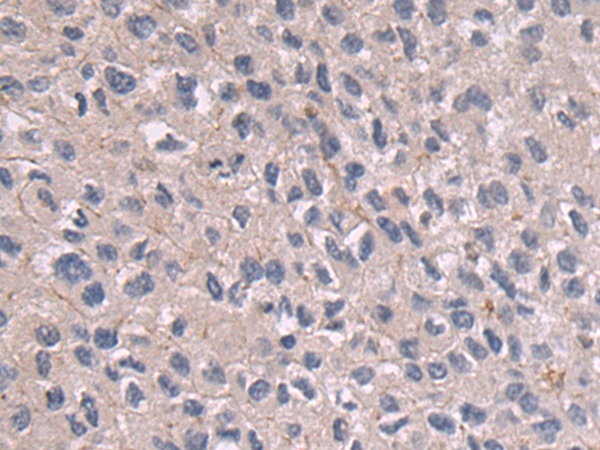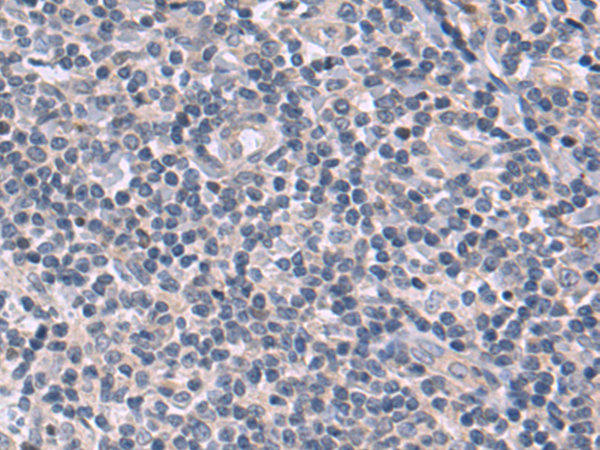


| WB | 咨询技术 | Human,Mouse,Rat |
| IF | 咨询技术 | Human,Mouse,Rat |
| IHC | 1/50-1/100 | Human,Mouse,Rat |
| ICC | 技术咨询 | Human,Mouse,Rat |
| FCM | 咨询技术 | Human,Mouse,Rat |
| Elisa | 1/5000-1/10000 | Human,Mouse,Rat |
| Aliases | SCC; T4-A; SCCA1; SSCA1; SCCA-1; HsT1196; SCCA-PD |
| WB Predicted band size | 45 kDa |
| Host/Isotype | Rabbit IgG |
| Antibody Type | Primary antibody |
| Storage | Store at 4°C short term. Aliquot and store at -20°C long term. Avoid freeze/thaw cycles. |
| Species Reactivity | Human |
| Immunogen | Fusion protein of human SERPINB3 |
| Formulation | Purified antibody in PBS with 0.05% sodium azide and 50% glycerol. |
+ +
以下是3篇关于SERPINB3抗体的参考文献及其摘要概括:
---
1. **文献名称**: *"SERPINB3 expression in cutaneous squamous cell carcinoma"*
**作者**: Vidotti, M. et al. (2014)
**摘要**: 该研究使用特异性SERPINB3抗体进行免疫组化分析,发现SERPINB3在皮肤鳞状细胞癌中高表达,并与肿瘤侵袭性相关,提示其可作为潜在预后标志物。
---
2. **文献名称**: *"SERPINB3 as a novel biomarker in liver fibrosis"*
**作者**: Pariyar, M. et al. (2019)
**摘要**: 通过Western blot和免疫荧光技术(使用SERPINB3单克隆抗体),研究发现慢性肝病患者中SERPINB3水平升高,与纤维化进展相关,可能通过调控TGF-β通路发挥作用。
---
3. **文献名称**: *"SERPINB3 in HPV-associated cervical cancer"*
**作者**: Tsuji, A. et al. (2002)
**摘要**: 该研究利用SERPINB3多克隆抗体检测宫颈癌组织,证实其在HPV感染相关癌变中过度表达,可能通过抑制凋亡促进肿瘤细胞存活。
---
4. **文献名称**: *"Protease inhibition by SERPINB3 in chronic liver disease"*
**作者**: Turato, C. et al. (2012)
**摘要**: 通过ELISA和免疫组化(基于SERPINB3抗体),研究揭示了SERPINB3在慢性肝病中的抗蛋白酶活性,可能通过保护细胞免受氧化应激损伤影响疾病进程。
---
以上文献均涉及SERPINB3抗体的实验应用(如检测表达水平、定位或功能研究),并探讨其在疾病机制中的潜在作用。如需具体期刊名称或PMID,可进一步补充检索。
SERPINB3. also known as squamous cell carcinoma antigen 1 (SCCA1), is a member of the serine protease inhibitor (serpin) superfamily. It primarily inhibits cysteine proteases, such as cathepsins, and plays roles in regulating inflammation, tissue remodeling, and apoptosis. SERPINB3 is typically expressed in epithelial tissues, including the skin, respiratory tract, and cervix. Its overexpression is linked to squamous cell carcinomas (e.g., cervical, lung, head/neck cancers) and chronic inflammatory conditions, such as liver fibrosis and psoriasis. The protein's structure includes a reactive center loop (RCL) that interacts with target proteases, forming irreversible complexes to block enzymatic activity.
SERPINB3 antibodies are immunological tools designed to detect and quantify SERPINB3 expression in research or diagnostic settings. These antibodies, often polyclonal or monoclonal, are validated for techniques like Western blotting, immunohistochemistry (IHC), and ELISA. They enable the study of SERPINB3's role in tumor progression, metastasis, and resistance to therapies. Clinically, SERPINB3 antibodies may aid in identifying cancer biomarkers or assessing disease severity in chronic liver disorders. However, cross-reactivity with homologous serpins (e.g., SERPINB4) requires careful validation to ensure specificity. Research using these antibodies continues to explore SERPINB3 as a therapeutic target or prognostic indicator in oncology and inflammatory diseases.
×